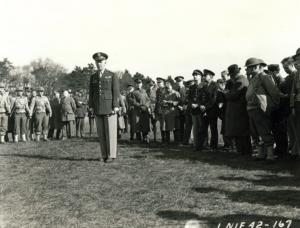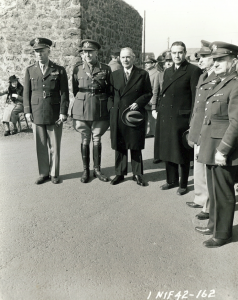
General George C. Marshall, Chief of Staff, U.S. Army, addresses officers on his trip to Northern Ireland in April 1942
Ireland and Britain have had a very rocky past for the better part of their shared history. This did not change during World War II. Northern Ireland, as part of the United Kingdom, took up arms in its defense. While many of Ireland’s men crossed the border into Northern Ireland and volunteered to serve with the British, the majority of Ireland (or Eire as it was called in Gaelic) choose neutrality instead.
Marshall was aware of the tensions in Ireland. The U.S. Ambassador to Ireland during the war, David Gray, wrote letters to Under Secretary of State Sumner Welles which Welles shared with Marshall in February 1942. Gray wrote of Ireland Prime Minister de Valera’s wish to remain neutral and his belief of British economic tyranny. Gray also expressed his concerned about arming the Irish Free State. Marshall circulated this information to Generals McNair, Daley and Arnold.

General George C. Marshall, Chief of Staff, U.S. Army; Lt. General H. E. Franklyn, G.O.C., N. I. British Forces; Mr. J. H. Andrews, Prime Minister of Northern Ireland; Mr. W. Averill Harriman, President Roosevelt’s personal envoy to Britain; Major General James E. Chaney United States Army Forces in the British Isles (USAFBI); and Major General R. P. Hartle, United States Army Northern Ireland Forces (USANIF), during their inspection tour of Northern Ireland.
A month after this memo, Marshall wrote to the President with the decision that no more troops would be sent to Northern Ireland. After the ARCADIA Conference, the United States had agreed to send troops into Northern Ireland to allow the British army to be involved in other campaigns. The code name MAGNET was used to describe the US troop movement from January 1942 to May 1942 to Northern Ireland.
Also in March of 1942, in a letter to the Under Secretary of State, Marshall stated that the US would not be sending arms or equipment to the Irish Free State. This would not be the last time Marshall had to deal with the issues concerning Ireland during the war. In 1943, Marshall sent to the Secretary of War a memo that had been forwarded to him. In it was a paraphrased telegram from the U.S. Ambassador to the United Kingdom John Winant suggesting that the U.S. government approach the Irish government about the issue of air and naval bases in Ireland.
While Marshall and the United States may not have sent arms or equipment to the Republic of Ireland during World War II, it was a recipient of Marshall Plan aid after the war. “Any wish to isolate Ireland in retaliation for its wartime neutrality was counterbalanced by the need, for security reasons, to incorporate the country into some American-sponsored organization.”
